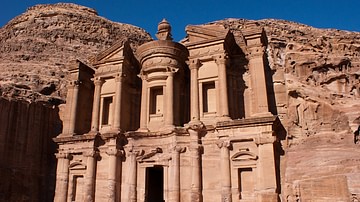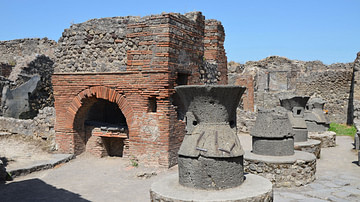Search
Did you mean: Boreas?
Search Results

Article
Battle of Friedland
The Battle of Friedland (14 June 1807) was a decisive battle of the Napoleonic Wars (1803-1815), fought by the armies of the French and Russian empires. A major French victory, Friedland caused the Russians to sue for peace, resulting in...

Article
Cliffs, Caves, Churches: A Weekend in Doolin, Ireland
County Clare, Ireland, is best known for the Cliffs of Moher, the ancient dolmen of Poulnabrone, and its rich musical heritage, but it offers many other fascinating sites and, most importantly, the hospitality and warmth of the people in...

Interview
Interview: The Werewolf in the Ancient World by Daniel Ogden
In this interview, World History Encyclopedia is talking to author Daniel Ogden about his new book The Werewolf in the Ancient World. Daniel Ogden (Author): Thank you for inviting me! Kelly (WHE): Of course, we are very excited to have...

Image Gallery
A Gallery of Jordan
The Hashemite Kingdom of Jordan was established in 1946, but the region has a history stretching back thousands of years. From the megalithic dolmens through the rise of cities, the reign of the Akkadian Empire, and on through the Kingdom...

Image
The Bakery of Popidius Priscus in Pompeii
Bread in Pompeii was produced daily in local bakeries. The Bakery (pistrinum) of Popidius Priscus contains four large millstones made from porous lava, traces of a stable, four storage rooms and a large oven which was used for baking the...

Definition
Byzantine Empire
The Byzantine Empire existed from 330 to 1453. It is often called the Eastern Roman Empire or simply Byzantium. The Byzantine capital was founded at Constantinople by Constantine I (r. 306-337). The Byzantine Empire varied in size over the...

Definition
RMS Titanic
The RMS Titanic was a White Star Line ocean liner, which sank after hitting an iceberg on its maiden voyage from Southampton to New York on 15 April 1912. Over 1,500 men, women, and children lost their lives. There were 705 survivors. In...

Definition
French Revolution
The French Revolution (1789-1799) was a period of major societal and political upheaval in France. It witnessed the collapse of the monarchy, the establishment of the First French Republic, and culminated in the rise of Napoleon Bonaparte...

Definition
Ancient Egyptian Government
The government of ancient Egypt was a theocratic monarchy as the king ruled by a mandate from the gods, initially was seen as an intermediary between human beings and the divine, and was supposed to represent the gods' will through the laws...

Definition
The Medieval Church
Religious practice in medieval Europe (c. 476-1500) was dominated and informed by the Catholic Church. The majority of the population was Christian, and "Christian" at this time meant "Catholic" as there was initially no other form of that...